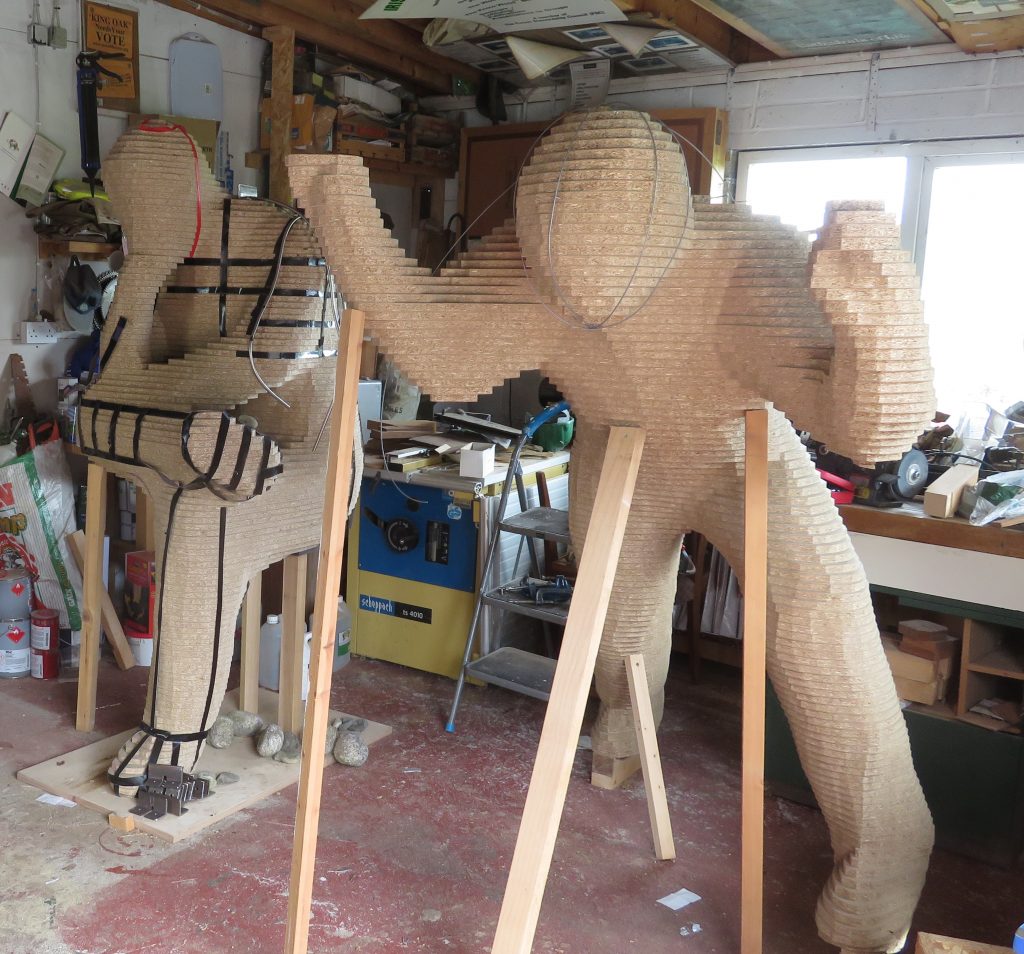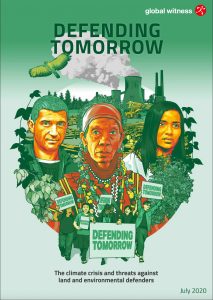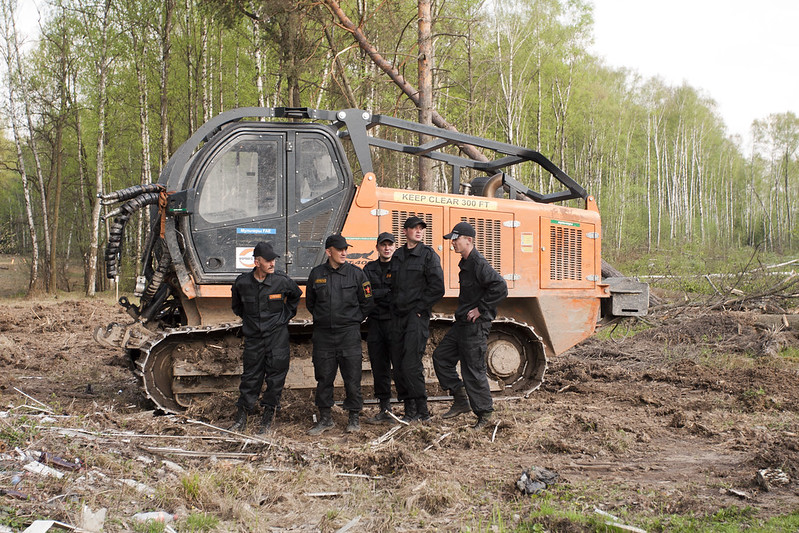County councils are vital as leaders in ethical practices in communities and as reminders of the global footprint of natural resources they use and the many people connected to that use, argues Tom Roche
Since its inception just eleven years ago, World Humanitarian Day commemorates the lives of humanitarian workers killed or injured in the course of their work. The day is set aside to honour all aid and health workers who continue, despite the odds, to provide life-saving support and protection to people most in need.
This year, as we know, COVID-19 has been the biggest challenge to humanitarian operations around the world. Restrictions placed by governments around the world in recent months has resulted in communities, civil society and local NGOs being the frontline of the response.
Two sides of the one coin

As a human/environmental rights activist, craftsman and educator, I fully support World Humanitarian Day and all that it stands for. There is no doubt in my mind that we should recognize and thank all the aid workers and health-care workers who strive so hard to save lives by risking their own. It is only right that the world community should celebrate and appreciate them by dedication this day to remember them.

The Oxfams, Concerns, Trócaires and Self-Help Africas’ of this world have carried out great humanitarian work over the decades by lifting millions of the world’s poor out of abject poverty. Their work is all that more important as we enter a new era of global challenges due in part to present and future pandemics.
However, this year I will add another cohort to my list of humanitarians. These are the oft-times forgotten, frontline defenders of our natural resources – soil, air, fresh water, forests, wildlife, biological diversity and centuries old cultural traditions. I’m talking here about the ‘recorded’ 212 environmental defenders who were murdered for standing up to climate-wrecking projects during 2019. For me ‘humanitarianism’ and ‘human rights’ are two sides of the one coin. In his article in the Times of Malta human rights teacher and activist, Colm Regan states,
“The Declaration [of Human Rights] is intrinsically educational in that it offers a ‘curriculum’ for becoming more fully human in contrast to the inhuman practices it sought to respond to. A curriculum by which we would fully ‘know’ human rights as an ideal as well as a reality.”
Frontline Defenders

A new report launched by Global Witness on Wednesday 29th July, shows that the numbers of men and women murdered in 2019 is up significantly on previous years.
The highest increase of murders took place against defenders opposed to the logging industry: the highest increase in killings globally since 2018, with 85% more attacks.
“Over 1 in 10 defenders killed were women. Often the backbone of their community, women tend to take on more of the responsibility of looking after children and elderly relatives, on top of trying to earn a living and work as activists. Women who act and speak out may also face gender-specific threats, including sexual violence. If other members of their household are defenders, they can become targeted too.”
According to the report Europe remains the least effected region, with two people killed in 2019, both working to stop illegal logging in Romania.
Why Tackling Illegal Logging is Important?
In June 1992, at the Earth Summit in Rio de Janeiro, Brazil, more than 178 countries adopted Agenda 21, a comprehensive plan of action to build a global partnership for sustainable development to improve human lives and protect the environment. All we have to do is to look around us to see the results of 30 years of our current economic development model that has plundered our forests, created millions of environmental refugees, threatened to wipe out 1 million species of lifeforms and caused weather conditions that have left millions homeless.
Our economic development is based on plundering the natural world: we plunder the seas for fish, we plunder forests for timber and fossil fuels, we plunder soils for food and rivers for fresh water. We urgently need a new economic model – an approach that recognises that natural resources and environmental services are the foundation of our livelihoods and economic development.
“Certification emerged from the 1992 Rio Earth Summit amid great hope that we could finally begin to address the wicked environmental and social problems facing our globe. Despite a proliferation of certification schemes in twenty-five industry sectors over more than twenty years, the environmental and social ills resulting from destructive and irresponsible exploitation of nature and human resources have grown still worse.”
– Beyond Certification by Scott Poynton
Yet, since the start of the industrial revolution we have wrongly treated natural resources as income instead of natural capital. By wrongly accounting for our natural resources and environmental services as ‘income’ instead of ‘capital’ we end up bankrupt – as Fritz Schumacher outlines in his bestselling book of 1973, Small is Beautiful: A Study of Economics as if People Mattered. The goods and services provided by the natural world make human development and economic trade possible and as such should be regarded as ‘capital’.
We continue to deplete our soils, destroy our forests, over-fish and pollute our oceans with oil and plastic. The resulting economic activity is treated as income, not as a decline in the endowment of natural capital. The world’s forests remain under threat from illegal logging – an issue that perpetuates corruption, undermines livelihoods, fuels social conflict, deprives governments of revenue and erodes the natural resource bases of countries.
“Now, each country has discovered further its fragility, reflected in the dependence on the rest of the world to satisfy the maintenance of the way of living, and at the same time, the isolation and loneliness when attempting to respond to a major exogenous shock. And it is just a beginning.”
– Viwanou Gnassounou is assistant secretary-general for sustainable economic development and trade at the Organisation of African, Caribbean and Pacific States.
Midlands Just Transition
The COVID-19 pandemic is a further reminder of the social, political and economic costs and challenges that come with the failure to safeguard our environment. One of the solutions is to empower the next generation with the right skills to tackle the landscape challenges of the future. While I’m all in favour of empowering the next generation, I believe it is much more important and much more urgent that we empower our local representatives and public servants on the rules of real sustainability that ensures a just transition not just for those affected by the Bord Na Mona layoffs but for the next generation that follows.
“The COVID-19 crisis has the potential to radically change development for the better. First, it shows how interconnected and interdependent our world has become: There is no way of tackling the COVID-19 crisis at national levels only; “helping you is helping me … solidarity is in my self-interest;” international cooperation and multilateralism are back!”
– San Bilal-head of trade, investment and finance at the European Centre for Development Policy Management.
Over the past 30 years of Just Forests activism I have watched as our local authorities and our elected representatives declared their commitment to sustainable development and human rights – only to discover soon after, to my frustration and anger, that on numerous occasions this was mere lip-service. A radical shift in attitude is needed in order to ensure the Midlands Just Transition Programme is truly ‘just’ and sustainable.
And here is where rules of engagement are so important.
How can anyone expect to win the game if all players are not playing by the same rules? The rules I am talking about have been around for quite a while now. The Irish government signed up to them at the Earth Summit in Rio de Janeiro in 1992.
Blueprint for a sustainable future
The 2030 Agenda for Sustainable Development, adopted by all United Nations Member States in 2015, including Ireland, provides a shared blueprint for peace and prosperity for people and the planet, now and into the future. At its heart are the 17 Sustainable Development Goals (SDGs), which are an urgent call for action by all countries – developed and developing – in a global partnership. They recognize that ending poverty, respecting human and environmental rights and other deprivations must go hand-in-hand with strategies that improve health and education, reduce inequality, and spur economic growth – all while tackling climate change and working to preserve our oceans and forests.
“Scientists warn that deforestation, industrial agriculture, illegal wildlife trade, climate change and other types of environmental degradation increase the risk of future pandemics, raising the probability of major human rights violations”
– David Boyd, UN Special Rapporteur on human rights and the environment (April 2020)
It has been so encouraging to see our politicians reacting so quickly and so decisively and listening to the science of the coronavirus pandemic over the past few months. Encourage them now to listen to and act immediately to the science of climate change, declining natural resources and biodiversity loss. It’s in our hands.
We need to see the same determination and leadership that is presently being applied to deal with the coronavirus pandemic applied to a new economic order that places climate, people’s health and well-being, and biodiversity at the heart of everything we do from here on. We must also remember that our children and grand-children will inherit what we leave them. How do we want to be remembered?
Dear Just Transition Commissioner
I’m calling on the government appointed, Just Transition Commissioner, Mr. Kieran Mulvey, to insist that all local authority staff, right across the board – from management to maintenance, and all elected representatives in the five counties in the Midlands Just Transition Programme undergo a compulsory course in the Sustainable Development Goals (SDGs)-the blueprint for a just and sustainable transition to a better economic, social and environmental model as a matter of urgency.
In order to remind Offaly County Council of their ‘timber policy’ and make my point as clear as I can, I will undertake a hunger strike commencing at 8:00 AM on Wednesday 19th August, outside Aras an Chontae, Charleville Road, Tullamore.
What am I asking for?
When we vote for a particular candidate to represent us at county council level we are saying “yes”, I believe he/she is a leader and can represent my views. But what if the person you voted for has no idea of the blueprint for change and the sustainable development objectives that is so urgently needed; what if they are not one bit familiar with the global agenda for change and just carry on a ‘business as usual’ agenda? What then?
This is why I am insisting that every elected representative must undertake a development education (DE) course/programme for change. The COVID-19 pandemic, as well as climate change, tells us in no uncertain and painful ways that we must change our way of doing business. We must act swiftly and without regret. Our survival and that of the next generation is at stake. But, if you don’t know what the rules of the game are, how do you know if you’re doing the right thing?
I am asking for the following actions across the Midlands Just Transition counties:
- Cease all use of tropical timber in all publicly funded works/projects with immediate effect
- Update the Responsible Timber Procurement Policy which was formally adopted by Offaly County Council in 2002 to reflect actions 1 and 3 as stated.
- Put a proper maintenance programme in place to deal with the years of neglect of timber products around each county.
- All staff and elected representatives of the counties engaged in the Midlands Just Transition programme are to undertake a development education (DE) course to ensure they gain the necessary knowledge to put the Sustainable Development Goals (SDGs) into action. This can be done by contacting the Irish Development Education Association (IDEA) and working with associate members.
- Reflect the significance of the SDGs on a dedicated section of their websites
- Educate the public of the role they can play by means of a monthly online article (such as a goal of the month). This can be linked to everyday life and a particular SDG that people can learn about and put into action in their own way.
- Hold regular, rotating, public information meetings around the counties where specific topics/issues can be aired and discussed, relating to the SDGs and the Decade on Ecosystem Restoration 2021-2030.
Why local authorities?
Why should we look to local authorities for guidance and leadership? In Ireland, local authorities construct, operate and maintain economic, social and environmental infrastructure. They oversee planning processes. They establish local environmental policies and regulations and assist in implementing national and sub-national environmental policies. They are very close to the people and as such they play a vital role in educating, training, funding, mobilizing and responding to the public’s needs.
In this regard, local authorities and local development companies – be they big or small – are important players for putting sustainable development into practice. Local Authorities are also very important consumers of goods and services. Their public procurement policy is a powerful tool for promoting the use of environmentally friendly products and services. In most cases, their behaviour is likely to have an important influence on the people they serve, and they should not miss the opportunity to become the role model for their local constituents. While some of them actually do mention/reference COVID – 19, nowhere in their promotional literature or on their respective websites have they mentioned the greater crisis that is actually driving COVID-19 i.e., catastrophic climate change.
For a truly just recovery from the harsh impacts of COVID-19 we must build back better. The coronavirus pandemic has increased the danger of timber exporting countries dropping their standards in order to regain economic losses. Building back better from COVID-19 means we must all play our part. Local authorities are ideally situated to ensure we do.
Tom Roche is a human/environmental rights activist, craftsman and educator. He is a native of Tullamore, now living in Rhode, Co Offaly

